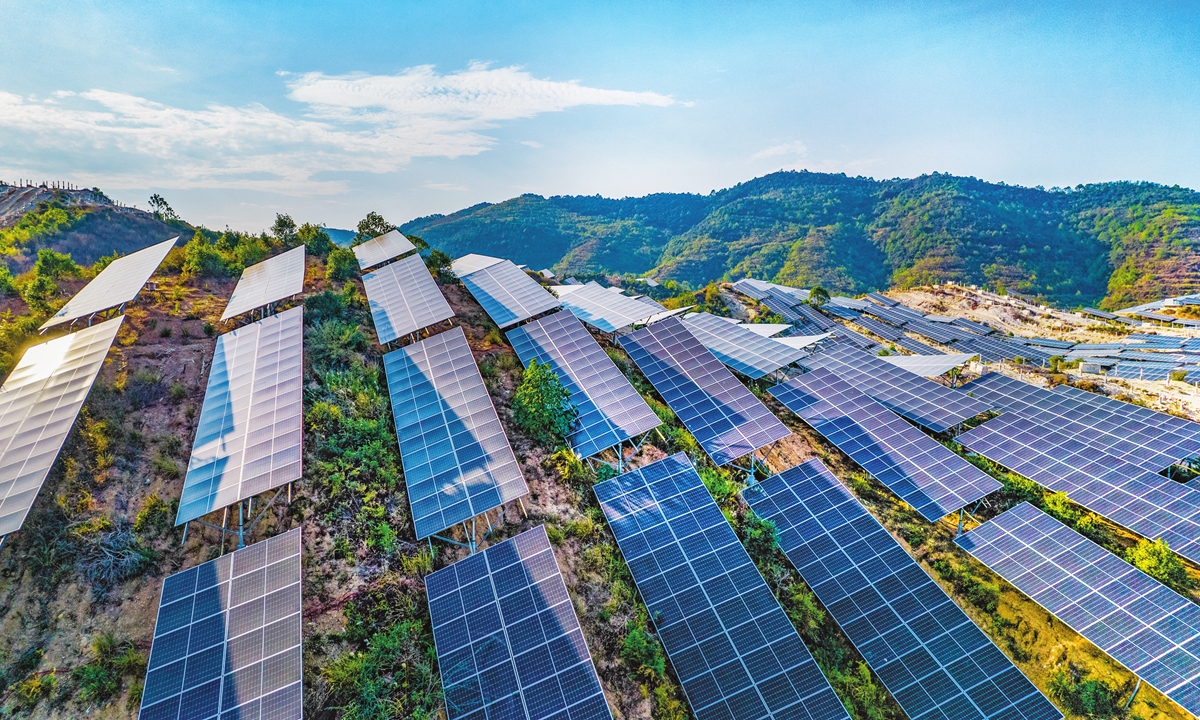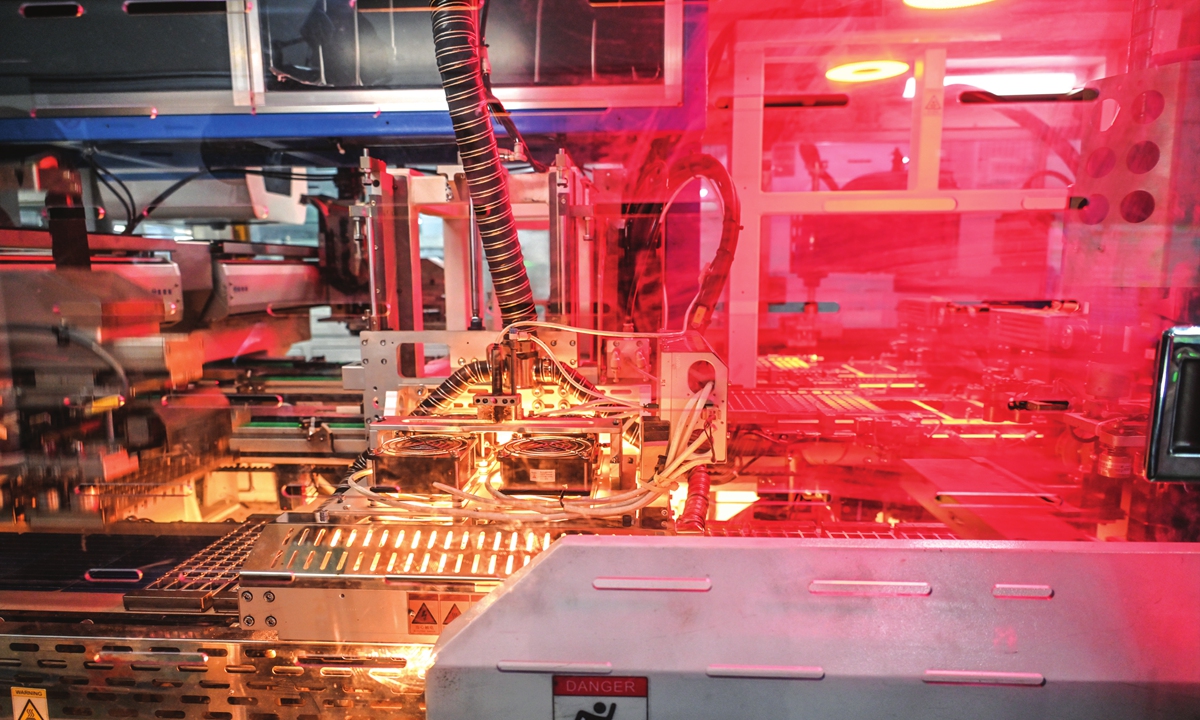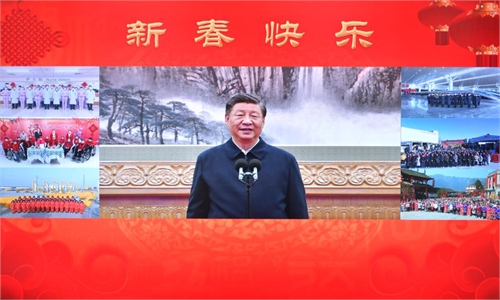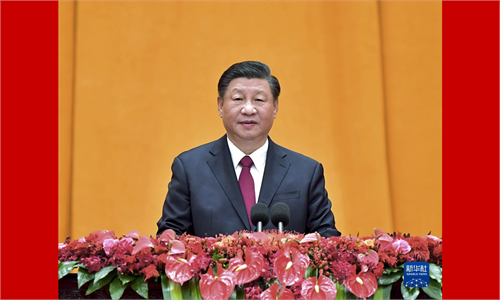Xiconomics in Practice: How Xi leads China in all-out effort to tackle tech 'bottleneck' to secure development
Days after the China ushered in the Year of the Rabbit with a particularly festive Spring Festival, President Xi Jinping rallied the nation for one of the most pressing tasks: Tackling the technological "bottleneck" to secure long-term high-quality development.
While presiding over a group study session of the Political Bureau of the 20th Communist Party of China (CPC) Central Committee on Tuesday, Xi, also the general secretary of the CPC Central Committee, stressed efforts to accelerate the establishment of a new pattern of development and enhance the security and initiative of development, while urging for the accelerated building of the country's self-reliance and solving of the issue of the foreign "stranglehold."
Establishing a new pattern of development is at the core of Xi's economic thought, which features innovative, coordinated, green, open, and shared development. The new development pattern, with the domestic economy as the mainstay and the domestic economy and international engagement providing mutual reinforcement, has become the guiding principle for China's social and economic policymaking, as both China and the world are facing a growing downward pressure amid an anti-globalization tide that is creating a fragmented global geo-economic landscape.
Over the last several years, China has made solid progress in fostering a new development pattern, with a steadily rising domestic market, ever-expanding global economic cooperation, and strengthened technological capabilities despite various challenges, analysts said. Particularly, Xi's call for "seizing every minute" to solve "bottleneck" problems has led to major breakthroughs in core technologies amid the US' relentless push for the erection of a technological blockade against China, firm and industry analysts noted.

During the study session of the Political Bureau of the 20th CPC Central Committee, Xi said that only by accelerating the establishment of new development can China enhance its strength to survive, compete, develop, and be sustainable amid all sorts of predictable and unpredictable storms and high winds to ensure that the process of the great rejuvenation of the Chinese nation will not be delayed or interrupted, and the goal of building China into a great modern socialist country will be realized, according to Xinhua.
Xi also urged efforts to accelerate the building of the country's self-reliance and strength in science and technology to solve the issue of the foreign "stranglehold."
This is the second group study session of the Political Bureau of the 20th CPC Central Committee, the Party's top decision-making body, underscoring the great importance the top leadership attaches to the issue of economic security as well as tackling the foreign technological blockade.
Such remarks reflect the top leadership's clear judgment on the current global situation, under which China is preparing for the worst-case scenario, while actively promoting global cooperation, Li Yong, deputy chairman of the Expert Committee of the China Association of International Trade, told the Global Times on Thursday.
Over the last week, as the world was buoyed by a rapid recovery in the world's second-largest economy during the Spring Festival holidays, some ominous signs also emerged.
In its relentless push for a technology "decoupling" from China, the US imposed or introduced several new restrictions on exports of tech components to Chinese firms and has reportedly secured deals with the Netherlands and Japan in its chip ban against China. The US has also reportedly launched tech and defense initiatives with India, which are widely viewed as designed to counter China.
As several international institutions have warned, the world is facing a growing risk of geo-economic fragmentation that could have dire consequences for the world. In a report in January, the International Monetary Fund warned that the world is facing the risk of policy-driven geo-economic fragmentation, which could cost the global economy up to 7 percent of economic output and up to 12 percent for some countries with additional technological decoupling.
"Under such circumstances, China has to focus on independent development in science and technologies," to address growing risks posed by the US' push for a technological decoupling, Li said.
Making real breakthroughs
Over the years, Xi's personal focus on China's independent technological development has translated into robust policy support for businesses across the country and has resulted in world-leading breakthroughs in a wide range of core technologies, industry insiders said.
Zhang Jin, president of Siasun Robot and Automation Co based in Shenyang, Northeast China's Liaoning Province, still recalls Xi's inspection tour of the assembly lines of the leading robot maker in August 2022 vividly.
"The general secretary's speech was inspiring and we were deeply encouraged and thrilled," Zhang told the Global Times. "We will strengthen our confidence, continue to innovate, and make China's robot industry stronger, bigger, and better."
During the visit, Xi closely observed the cutting-edge innovations, asked the technicians and workers about the enterprise's research on core technologies, and praised the enterprise's achievements in independent innovation and industrial development, according to Xinhua.
"We should promote self-reliance and self-improvement in science and technology, seizing every minute to make breakthroughs in solving 'bottleneck' problems, and striving to have the core technologies in key areas and the equipment manufacturing industry in our own hands," Xi stressed.
Siasun is heeding Xi's calls for striving for breakthroughs. According to Zhang, the company has completed more than 800 important national scientific and technological research projects and has registered more than 1,300 invention patents.
Siasun is only one of the countless Chinese technological firms Xi has visited over the years. Gong Zheng, an employee at HGLaser Engineering Co, a leading laser equipment company in Wuhan, Central China's Hubei Province, said that he felt a sense of honor and mission when listening to Xi's encouraging words at HGLaser in June 2022.
During the visit to HGLaser, Xi said that breaking through bottlenecks in core technologies in key fields has been a pressing task, calling for a speedy realization of the country's scientific and technological self-reliance, according to Xinhua.
Gong, who is currently heading the research on semiconductor vision technology, vowed to step up efforts to tackle challenges to introduce more Chinese manufacturing equipment in the semiconductor industry, according to a statement the company sent to the Global Times on Thursday.

Over the years, Xi's focus on China's independent technological development has covered a wide range of areas, in addition to robots and semiconductors. During a visit to a subsidiary of the Shanxi Taigang Stainless Steel Co. in North China's Shanxi Province in May 2020, Xi said products and technology are the lifeline of businesses, calling for more efforts in technological innovation to make a greater contribution to the development of advanced manufacturing, Xinhua reported.
Since then, Shanxi Taigang has been making steady progress in technological research and development, and in tackling bottleneck problems in both technologies and products, the company told the Global Times. In 2022, the company pushed forward the research and development of 16 new innovative products, it said.
In 2020, the subsidiary of Taigang achieved major breakthroughs, as it produced the world's thinnest stainless steel with a thickness of 0.015 millimeters, which can be used in the manufacturing of new-energy vehicle batteries.
Becoming a 'global pacesetter'
Such breakthroughs in various core fields together represent China's strengthening of technological capabilities and the country's rise as a technological power.
According to the latest Global Innovation Index released by the World Intellectual Property Organization in August 2022, the Chinese mainland further climbed up the rankings to 11th place, up one place from the 2021 ranking, and 23 spots up from a decade ago.
China's research and development expenditure also ranks 2nd worldwide and its total R&D workforce is the world's largest, according to Chinese official data. In 2022, despite downward economic pressure, China's total R&D expenditure surged by 10.4 percent to nearly 3.09 trillion yuan ($456 billion), hitting the 3 trillion yuan milestone for the first time, official data showed.
During the study session on Tuesday, Xi called for efforts to boost strategic sci-tech strength, to make the country a global pacesetter in key scientific and technological fields.
While China is making steady progress in becoming a world technological power, the country is also actively promoting international cooperation. At the study session, Xi also stressed support for enterprises' full participation in the global industrial division of labor and cooperation, promotion of deeper integration of domestic and foreign industries, and construction of a modern industrial system that is independent, controllable, safe, reliable and highly competitive.
Such a focus on international cooperation also stands in stark contrast to the US' efforts to create a fragmented world to preserve its own technological hegemony, analysts noted.
"Strengthening independent development does not mean China wants to see two geo-economic systems. China supports globalization and will, under the framework of building a global community with a shared future, promote technological cooperation and achieve win-win results," Li said.
While presiding over a group study session of the Political Bureau of the 20th Communist Party of China (CPC) Central Committee on Tuesday, Xi, also the general secretary of the CPC Central Committee, stressed efforts to accelerate the establishment of a new pattern of development and enhance the security and initiative of development, while urging for the accelerated building of the country's self-reliance and solving of the issue of the foreign "stranglehold."
Establishing a new pattern of development is at the core of Xi's economic thought, which features innovative, coordinated, green, open, and shared development. The new development pattern, with the domestic economy as the mainstay and the domestic economy and international engagement providing mutual reinforcement, has become the guiding principle for China's social and economic policymaking, as both China and the world are facing a growing downward pressure amid an anti-globalization tide that is creating a fragmented global geo-economic landscape.
Over the last several years, China has made solid progress in fostering a new development pattern, with a steadily rising domestic market, ever-expanding global economic cooperation, and strengthened technological capabilities despite various challenges, analysts said. Particularly, Xi's call for "seizing every minute" to solve "bottleneck" problems has led to major breakthroughs in core technologies amid the US' relentless push for the erection of a technological blockade against China, firm and industry analysts noted.

Photovoltaic power stations in Xinyu,East China's Jiangxi Province Photo: VCG
Tackling foreign 'stranglehold'During the study session of the Political Bureau of the 20th CPC Central Committee, Xi said that only by accelerating the establishment of new development can China enhance its strength to survive, compete, develop, and be sustainable amid all sorts of predictable and unpredictable storms and high winds to ensure that the process of the great rejuvenation of the Chinese nation will not be delayed or interrupted, and the goal of building China into a great modern socialist country will be realized, according to Xinhua.
Xi also urged efforts to accelerate the building of the country's self-reliance and strength in science and technology to solve the issue of the foreign "stranglehold."
This is the second group study session of the Political Bureau of the 20th CPC Central Committee, the Party's top decision-making body, underscoring the great importance the top leadership attaches to the issue of economic security as well as tackling the foreign technological blockade.
Such remarks reflect the top leadership's clear judgment on the current global situation, under which China is preparing for the worst-case scenario, while actively promoting global cooperation, Li Yong, deputy chairman of the Expert Committee of the China Association of International Trade, told the Global Times on Thursday.
Over the last week, as the world was buoyed by a rapid recovery in the world's second-largest economy during the Spring Festival holidays, some ominous signs also emerged.
In its relentless push for a technology "decoupling" from China, the US imposed or introduced several new restrictions on exports of tech components to Chinese firms and has reportedly secured deals with the Netherlands and Japan in its chip ban against China. The US has also reportedly launched tech and defense initiatives with India, which are widely viewed as designed to counter China.
As several international institutions have warned, the world is facing a growing risk of geo-economic fragmentation that could have dire consequences for the world. In a report in January, the International Monetary Fund warned that the world is facing the risk of policy-driven geo-economic fragmentation, which could cost the global economy up to 7 percent of economic output and up to 12 percent for some countries with additional technological decoupling.
"Under such circumstances, China has to focus on independent development in science and technologies," to address growing risks posed by the US' push for a technological decoupling, Li said.
Making real breakthroughs
Over the years, Xi's personal focus on China's independent technological development has translated into robust policy support for businesses across the country and has resulted in world-leading breakthroughs in a wide range of core technologies, industry insiders said.
Zhang Jin, president of Siasun Robot and Automation Co based in Shenyang, Northeast China's Liaoning Province, still recalls Xi's inspection tour of the assembly lines of the leading robot maker in August 2022 vividly.
"The general secretary's speech was inspiring and we were deeply encouraged and thrilled," Zhang told the Global Times. "We will strengthen our confidence, continue to innovate, and make China's robot industry stronger, bigger, and better."
During the visit, Xi closely observed the cutting-edge innovations, asked the technicians and workers about the enterprise's research on core technologies, and praised the enterprise's achievements in independent innovation and industrial development, according to Xinhua.
"We should promote self-reliance and self-improvement in science and technology, seizing every minute to make breakthroughs in solving 'bottleneck' problems, and striving to have the core technologies in key areas and the equipment manufacturing industry in our own hands," Xi stressed.
Siasun is heeding Xi's calls for striving for breakthroughs. According to Zhang, the company has completed more than 800 important national scientific and technological research projects and has registered more than 1,300 invention patents.
Siasun is only one of the countless Chinese technological firms Xi has visited over the years. Gong Zheng, an employee at HGLaser Engineering Co, a leading laser equipment company in Wuhan, Central China's Hubei Province, said that he felt a sense of honor and mission when listening to Xi's encouraging words at HGLaser in June 2022.
During the visit to HGLaser, Xi said that breaking through bottlenecks in core technologies in key fields has been a pressing task, calling for a speedy realization of the country's scientific and technological self-reliance, according to Xinhua.
Gong, who is currently heading the research on semiconductor vision technology, vowed to step up efforts to tackle challenges to introduce more Chinese manufacturing equipment in the semiconductor industry, according to a statement the company sent to the Global Times on Thursday.

A solar technology production line in Shanghai Photo: IC
Semiconductor technology in particular has become a top target for the US' push for technological "decoupling" from China, as Washington has introduced what has been widely seen as the harshest chip ban on China.Over the years, Xi's focus on China's independent technological development has covered a wide range of areas, in addition to robots and semiconductors. During a visit to a subsidiary of the Shanxi Taigang Stainless Steel Co. in North China's Shanxi Province in May 2020, Xi said products and technology are the lifeline of businesses, calling for more efforts in technological innovation to make a greater contribution to the development of advanced manufacturing, Xinhua reported.
Since then, Shanxi Taigang has been making steady progress in technological research and development, and in tackling bottleneck problems in both technologies and products, the company told the Global Times. In 2022, the company pushed forward the research and development of 16 new innovative products, it said.
In 2020, the subsidiary of Taigang achieved major breakthroughs, as it produced the world's thinnest stainless steel with a thickness of 0.015 millimeters, which can be used in the manufacturing of new-energy vehicle batteries.
Becoming a 'global pacesetter'
Such breakthroughs in various core fields together represent China's strengthening of technological capabilities and the country's rise as a technological power.
According to the latest Global Innovation Index released by the World Intellectual Property Organization in August 2022, the Chinese mainland further climbed up the rankings to 11th place, up one place from the 2021 ranking, and 23 spots up from a decade ago.
China's research and development expenditure also ranks 2nd worldwide and its total R&D workforce is the world's largest, according to Chinese official data. In 2022, despite downward economic pressure, China's total R&D expenditure surged by 10.4 percent to nearly 3.09 trillion yuan ($456 billion), hitting the 3 trillion yuan milestone for the first time, official data showed.
During the study session on Tuesday, Xi called for efforts to boost strategic sci-tech strength, to make the country a global pacesetter in key scientific and technological fields.
While China is making steady progress in becoming a world technological power, the country is also actively promoting international cooperation. At the study session, Xi also stressed support for enterprises' full participation in the global industrial division of labor and cooperation, promotion of deeper integration of domestic and foreign industries, and construction of a modern industrial system that is independent, controllable, safe, reliable and highly competitive.
Such a focus on international cooperation also stands in stark contrast to the US' efforts to create a fragmented world to preserve its own technological hegemony, analysts noted.
"Strengthening independent development does not mean China wants to see two geo-economic systems. China supports globalization and will, under the framework of building a global community with a shared future, promote technological cooperation and achieve win-win results," Li said.



